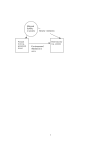Do intrauterine or genetic influences explain the foetal origins of chronic disease? A novel experimental method for disentangling effects
- PMID: 17587444
- PMCID: PMC1913535
- DOI: 10.1186/1471-2288-7-25
Do intrauterine or genetic influences explain the foetal origins of chronic disease? A novel experimental method for disentangling effects
Abstract
Background: There is much evidence to suggest that risk for common clinical disorders begins in foetal life. Exposure to environmental risk factors however is often not random. Many commonly used indices of prenatal adversity (e.g. maternal gestational stress, gestational diabetes, smoking in pregnancy) are influenced by maternal genes and genetically influenced maternal behaviour. As mother provides the baby with both genes and prenatal environment, associations between prenatal risk factors and offspring disease maybe attributable to true prenatal risk effects or to the "confounding" effects of genetic liability that are shared by mother and offspring. Cross-fostering designs, including those that involve embryo transfer have proved useful in animal studies. However disentangling these effects in humans poses significant problems for traditional genetic epidemiological research designs.
Methods: We present a novel research strategy aimed at disentangling maternally provided pre-natal environmental and inherited genetic effects. Families of children aged 5 to 9 years born by assisted reproductive technologies, specifically homologous IVF, sperm donation, egg donation, embryo donation and gestational surrogacy were contacted through fertility clinics and mailed a package of questionnaires on health and mental health related risk factors and outcomes. Further data were obtained from antenatal records.
Results: To date 741 families from 18 fertility clinics have participated. The degree of association between maternally provided prenatal risk factor and child outcome in the group of families where the woman undergoing pregnancy and offspring are genetically related (homologous IVF, sperm donation) is compared to association in the group where offspring are genetically unrelated to the woman who undergoes the pregnancy (egg donation, embryo donation, surrogacy). These comparisons can be then examined to infer the extent to which prenatal effects are genetically and environmentally mediated.
Conclusion: A study based on children born by IVF treatment and who differ in genetic relatedness to the woman undergoing the pregnancy is feasible. The present report outlines a novel experimental method that permits disaggregation of maternally provided inherited genetic and post-implantation prenatal effects.
Figures
Similar articles
-
The links between prenatal stress and offspring development and psychopathology: disentangling environmental and inherited influences.Psychol Med. 2010 Feb;40(2):335-45. doi: 10.1017/S0033291709005911. Epub 2009 May 29. Psychol Med. 2010. PMID: 19476689 Free PMC article.
-
Prenatal smoking might not cause attention-deficit/hyperactivity disorder: evidence from a novel design.Biol Psychiatry. 2009 Oct 15;66(8):722-7. doi: 10.1016/j.biopsych.2009.05.032. Epub 2009 Jul 12. Biol Psychiatry. 2009. PMID: 19596120 Free PMC article.
-
Estimating the relative contributions of maternal genetic, paternal genetic and intrauterine factors to offspring birth weight and head circumference.Early Hum Dev. 2010 Jul;86(7):425-32. doi: 10.1016/j.earlhumdev.2010.05.021. Epub 2010 Jun 20. Early Hum Dev. 2010. PMID: 20646882 Free PMC article.
-
Egg donation and gestational surrogacy: Pregnancy is riskier with an unrelated embryo.Early Hum Dev. 2024 Sep;196:106072. doi: 10.1016/j.earlhumdev.2024.106072. Epub 2024 Jul 2. Early Hum Dev. 2024. PMID: 39106717 Review.
-
Surrogacy: outcomes for surrogate mothers, children and the resulting families-a systematic review.Hum Reprod Update. 2016 Mar-Apr;22(2):260-76. doi: 10.1093/humupd/dmv046. Epub 2015 Oct 9. Hum Reprod Update. 2016. PMID: 26454266 Review.
Cited by
-
Annual Research Review: Towards a deeper understanding of nature and nurture: combining family-based quasi-experimental methods with genomic data.J Child Psychol Psychiatry. 2023 Apr;64(4):693-707. doi: 10.1111/jcpp.13720. Epub 2022 Nov 15. J Child Psychol Psychiatry. 2023. PMID: 36379220 Free PMC article. Review.
-
Systematic Review and Meta-analysis of Genetically Informed Research: Associations Between Parent Anxiety and Offspring Internalizing Problems.J Am Acad Child Adolesc Psychiatry. 2021 Jul;60(7):823-840. doi: 10.1016/j.jaac.2020.12.037. Epub 2021 Mar 3. J Am Acad Child Adolesc Psychiatry. 2021. PMID: 33675965 Free PMC article.
-
Maternal Prenatal Smoking and Autism Spectrum Disorder in Offspring: A California Statewide Cohort and Sibling Study.Am J Epidemiol. 2021 May 4;190(5):728-737. doi: 10.1093/aje/kwaa182. Am J Epidemiol. 2021. PMID: 32830844 Free PMC article.
-
Family-Based Designs that Disentangle Inherited Factors from Pre- and Postnatal Environmental Exposures: In Vitro Fertilization, Discordant Sibling Pairs, Maternal versus Paternal Comparisons, and Adoption Designs.Cold Spring Harb Perspect Med. 2021 Mar 1;11(3):a038877. doi: 10.1101/cshperspect.a038877. Cold Spring Harb Perspect Med. 2021. PMID: 32152247 Free PMC article. Review.
-
Do natural experiments have an important future in the study of mental disorders?Psychol Med. 2019 May;49(7):1079-1088. doi: 10.1017/S0033291718003896. Epub 2019 Jan 4. Psychol Med. 2019. PMID: 30606278 Free PMC article. Review.
References
Publication types
MeSH terms
Grants and funding
LinkOut - more resources
Full Text Sources
Medical
Research Materials


